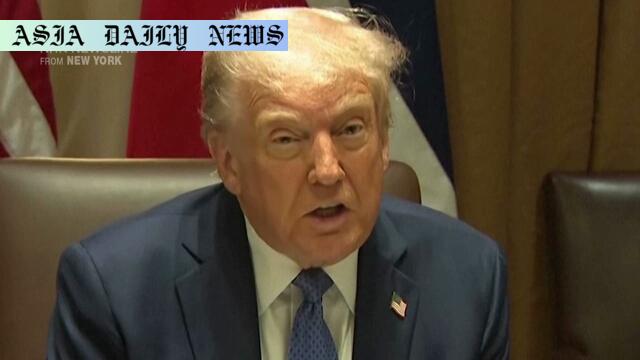Trump urges both sides to come to the table for peace talks.
Trump urges Ukraine and Russia to negotiate for peace.
A large-scale Russian strike on Kyiv leaves 12 dead, 90 injured.
Ukraine counters US peace proposal, maintaining core values.
Western media reports potential recognition of Crimea annexation.

Trump’s Push for Peace Amid Escalating Tensions
The ongoing conflict between Ukraine and Russia has prompted significant international attention, with US President Donald Trump stepping into the fray to propose a peace plan. During discussions with Norwegian Prime Minister Jonas Gahr Store, Trump emphasized the necessity for both sides to negotiate peace. His urgency stems from the latest Russian missile and drone strike on Kyiv, which resulted in 12 fatalities and 90 injuries, further escalating the humanitarian crisis. Trump remarked, ‘They both want peace, but they have to get to the table. We’re waiting a long time. And I think we’re going to get peace.’
However, Trump’s relations with Russian President Vladimir Putin have drawn criticism, particularly from those affected by the violence. A Kyiv resident emotionally recounted the horror brought about by missile attacks, highlighting the loss of innocent lives. These perspectives intensify the scrutiny over the US administration’s intentions and the feasibility of the proposed peace plan. Trump’s idea allegedly includes recognition of Russia’s annexation of Crimea in 2014, a move that starkly contrasts with Ukrainian sovereignty and its constitutional values.
Ukraine’s Counter-Proposal and Challenges Ahead
Ukrainian President Volodymyr Zelenskyy, maintaining his nation’s staunch position on sovereignty, revealed that his administration put forward a counter-proposal. He emphasized the importance of upholding Ukrainian values and constitutional principles in any agreement. ‘Anything that contradicts our values or our constitution cannot be in any agreements,’ Zelenskyy declared, reiterating the non-negotiable stance of his government.
Meanwhile, the current international focus is on whether the recent Russian attacks will deter negotiations or prompt urgency in resolving the conflict. The civilian toll underscores the pressing need for diplomatic engagement. Peace efforts require delicate navigation to incorporate both parties’ demands without undermining core ethical and constitutional benchmarks. Ultimately, whether Trump’s deadline leads to tangible results or further stalemates remains uncertain, especially in a context riddled with complex political ambitions and human suffering.
Global Implications and Paths Forward
The ramifications of this diplomatic impasse stretch beyond the borders of Ukraine and Russia. Western media’s coverage of the US peace proposal, which may accommodate Russian annexation ambitions, sparks fears of setting a global precedent. If Ukraine’s territorial losses are legitimized, it could embolden other nations to pursue aggressive territorial claims, destabilizing international relations.
Conversely, achieving peace through mutual understanding could serve as a testament to the power of diplomacy in resolving modern conflicts. Whether peace can be achieved, however, hinges on the willingness of all entities involved to prioritize humanity over personal agendas. The international community must work tirelessly to safeguard Ukrainian sovereignty while also addressing Russia’s demands in a manner that does not perpetuate violence or injustice. Trump’s current deadline, though ambitious, offers an opportunity to steer the narrative toward resolution.
Commentary
Analyzing Trump’s Approach to Peace
President Trump’s push for a resolution between Ukraine and Russia comes at a pivotal moment in the geopolitical landscape. His remarks reflect a sense of urgency, driven by humanitarian concerns and the escalating consequences of continued conflict. The recent attack on Kyiv, leaving multiple casualties, underscores the suffering endured by civilians and the need for immediate international intervention. However, Trump’s proposed peace plan, which reportedly includes recognition of Russia’s annexation of Crimea, raises significant ethical and geopolitical concerns.
Through his actions, Trump communicates confidence in his ability to broker peace, but his close association with Vladimir Putin raises questions about neutrality. Can a leader maintain objectivity when fostering relationships with one side of the conflict? This question resonates strongly, especially among critics who point to the perceived advantage given to Russia in such peace proposals. For Ukraine, the prospect of compromising its territorial integrity against its constitution creates a tremendous dilemma.
The Role of Diplomacy and Global Responsibility
Diplomatic resolution often requires concessions, but it is crucial to evaluate the long-term implications of such compromises. Recognizing Crimea as Russian territory could set a dangerous precedent, encouraging hostilities elsewhere in the world. Similarly, Ukraine’s unwavering stance in defending its sovereignty sends a strong message about the importance of constitutional values and territorial integrity, but it must operate within the pragmatic reality of ongoing violence affecting its citizens.
The international community has a role in ensuring these negotiations are fair, balanced, and rooted in the principles of peace and justice. Rather than tilting the scales toward a single entity, mediators must adopt an impartial stance, emphasizing humanitarian needs and the need for long-term stability. This is undoubtedly a challenging course but an essential one for any prospect of meaningful resolution.


